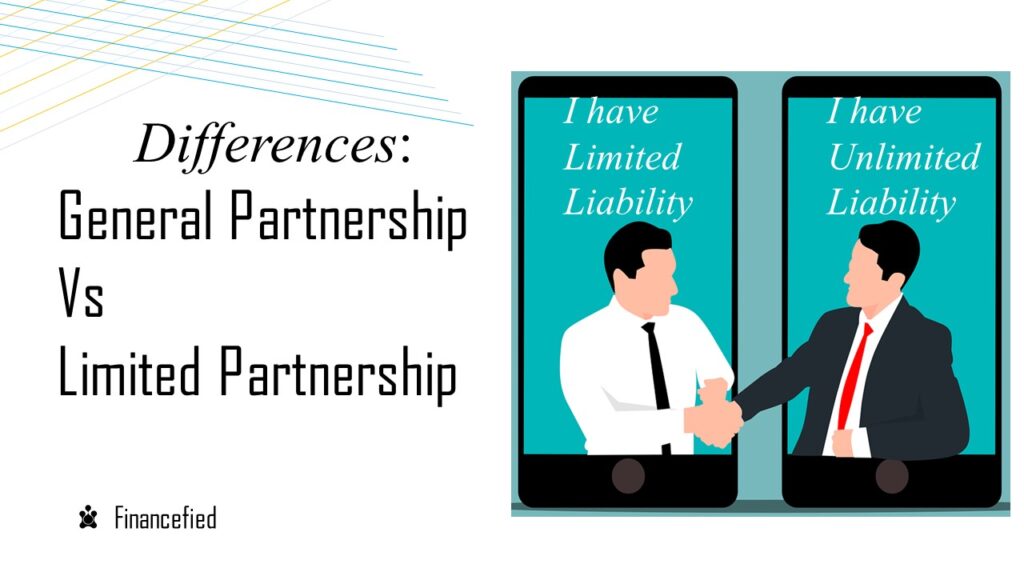General and limited partnerships differ in many aspects. This list takes you through major contrasts between General Partnership Vs Limited Partnership businesses.

General Partnership Vs Limited Partnership
Liability:
A general partnership business is not separate from the general partners hence unlimited liability. However, a limited partnership business has a limited liability.
If a general partnership business defaults on loan, creditors have a legal right to take the general partners’ assets to recover the defaulted money. If a limited partnership business defaults on loan, creditors can only repossess the amount contributed by each partner in their business. They cannot extend to take personal assets and belongings of limited partners.
Formation:
In forming a general partnership, it is optional to go through the legal registration process. On the contrary, forming a limited partnership requires legal documentation of establishment.
A general partnership is less formal, eliminating the need for legal documentation within the state where the business operates. Authorities refrain from demanding formal incorporation papers from general partners because their partnership business is not directly taxed. Instead, the government taxes the general partners in question.
A limited partnership is a separate legal entity from its owners. For separation to be effected, the state demands the incorporation of a limited partnership. When a limited partnership has been incorporated, partners are protected by the law on the extent to which they are liable for their partnership’s business debt.
Nature of partners:
In a general partnership business, all partners are general. On the contrary, only one partner is required to be a general partner in a limited partnership. Others can be limited partners and enjoy unlimited liability.
Since all partners in a general partnership business are general, everyone has unlimited liability to the company’s financial obligations. In the case of a limited partnership business, it is only the single general partner who has unlimited liability.
Formality:
A general partnership is less formal as it can be formed from a mutual agreement. On the other hand, a limited partnership is a formal business recognized by the state as an incorporation.
In most cases, general partners are encouraged to have formal agreement documentation in case of a dispute. It helps them manoeuvre within business conflicts that might face them in future.
Management:
In a general partnership, everyone actively manages their business operations. However, only a general partner in a limited partnership is mandated to play an active role in the management of their partnership business.
In a limited partnership business, the general partner oversees daily business operations. Limited partners are just investors. They expect the general partner to run the partnership business profitably on their behalf and grow the amount they committed as capital.
The general partner in a limited partnership business must be very cautious about how they run the affairs of the business in question. If they happen to make bad decisions that lead the business into a financial crisis, they are partially liable to be such dues personally.
Liability insurance:
General partners in a general partnership form of business transfer their unlimited liability to an insurer by taking a liability insurance cover. Liability insurance coverage is not necessary for a limited partnership business. This is because partners are only liable to the extent of the amount they contributed as capital.
General partners opt for liability insurance cover for fear of a hefty liability that could befall them. Limited partners in a limited partnership do not have to constantly worry about their business’s unprecedented hefty financial liability.
Partners compensation:
General partners in both general and limited partnership businesses are entitled to a salary-like compensation. Limited partners in a limited partnership business and not entitled to such compensation.
It makes sense to compensate a general partner because, one, they actively manage the business and, two, they have unlimited liability. It is just logical to appreciate the willingness to have unlimited liability.
Taxation:
For general partnership business, general partners are required to pay self-employment tax. On the contrary, limited partners in a limited liability business are not obliged to pay self-employment tax.
This follows logic; a general partner is managing a business they partially own. They are, therefore, in a self-employment business. A limited partner is an investor. They do not play an active role in running the business in question.
Related Articles:
- Dissolution of Partnership Firm: 6 Circumstances
- 20 Advantages and Disadvantages of Partnership
- Partnership Definition, Characteristics, Formation and Funding
- Characteristics of Corporation: 8 Most Common
- Corporation Advantages: 5 Most Important
- 4 Forms of Business Organization
- Limited Liability Company Definition, Formation and Types
- Sole Proprietorship Meaning and Examples
